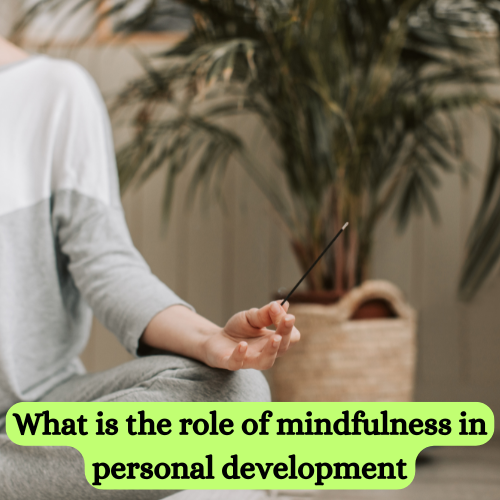Unleash Your Potential: The Transformative Role of Mindfulness in Personal Development
Recent studies show that over 70% of adults experience stress regularly, impacting their overall well-being. This reveals just how crucial it is to find effective ways to cope. Mindfulness, which encourages focus on the present moment, plays a vital role in personal development. By practicing mindfulness, we can enhance self-awareness, manage our emotions better, and build resilience, leading to substantial personal growth.
Understanding the Mindful Approach
Defining Mindfulness
Mindfulness means being fully present and engaged in the moment, without judgment. It involves observing your thoughts, feelings, and surroundings with curiosity and acceptance. This awareness can transform how you perceive and respond to life’s challenges.
The Science of Mindfulness
Research indicates that mindfulness practices can lead to changes in the brain. Studies show increases in grey matter in areas linked to emotion regulation and self-referential thought. These changes contribute to better mental health and enhanced cognitive abilities.
Mindfulness vs. Meditation
While mindfulness is often associated with meditation, they are not the same. Meditation is a practice that can cultivate mindfulness. However, mindfulness can be integrated into everyday activities, making it more accessible.
Mindfulness and Self-Awareness
Cultivating Self-Compassion
Mindfulness encourages a kinder attitude towards oneself. Engaging in self-compassion means treating yourself as you would a good friend, particularly during tough times. This shift in mindset can foster personal growth.
Identifying Negative Thought Patterns
Mindfulness aids in spotting negative thought patterns. When we observe our thoughts without judgment, we can challenge their validity. Recognizing these patterns allows for healthier responses and improved mental well-being.
Enhancing Emotional Intelligence
Emotional intelligence is crucial for personal development. Mindfulness helps in acknowledging emotions without being overwhelmed. This awareness leads to better emotional regulation and stronger relationships.
- Skills for the Future Level Up Your Life
- Future-Proof Your Career: 10 Skills to Master in 2025
- From Home Office to Big Profit: Top Remote Jobs That Pay Well
- 20 Side Hustles You Can Start Today to Make Money Online
- Freelance Your Way to Success: Top Online Gigs for Extra Income
- How to Turn Your Hobbies into an Income Stream Online
- Monetag: The Best Alternative to Google AdSense
- How to Start a Successful Blog That Actually Makes Money
- From Home Office to Big Profit: Top Remote Jobs That Pay Well
Mindfulness for Stress Management and Resilience
Stress Reduction Techniques
Several techniques can reduce stress through mindfulness, such as:
- Deep Breathing: Focusing on your breath to promote relaxation.
- Body Scan Meditation: Paying attention to different parts of your body to relieve tension.
Building Resilience
Mindfulness builds resilience by developing coping strategies. When facing setbacks, a mindful approach allows you to respond thoughtfully rather than react impulsively, leading to greater emotional strength.
Real-World Example
Consider Sarah, a busy professional who felt overwhelmed by work. By incorporating mindfulness practices into her daily routine, she learned to pause and breathe during stressful moments. Over time, Sarah found herself handling pressure with greater ease, showcasing how mindfulness can transform responses to stress.
Practical Applications of Mindfulness in Daily Life
Incorporating Mindfulness into Your Routine
Integrating mindfulness can be simple. Here are some practical steps:
- Mindful Eating: Savor each bite and appreciate flavors.
- Mindful Walking: Notice the sensations of your feet touching the ground.
- Daily Reflection: Take a moment to reflect on your day without distractions.
Mindfulness Apps and Resources
Several resources can help you stay on track with mindfulness. Popular apps include:
- Headspace
- Calm
- Insight Timer
These tools offer guided meditations and mindfulness exercises to aid your practice.
Setting Realistic Goals
It’s essential to set realistic goals when adopting mindfulness. Start small. Aim for just a few minutes a day and gradually increase your practice. Consistency over time yields the best results.
Mindfulness and Goal Achievement
Enhancing Focus and Concentration
Mindfulness sharpens focus and concentration. With better attention, you can tackle tasks, leading to higher productivity and improved goal achievement.
Fostering Self-Discipline
By developing mindfulness, you enhance self-discipline. A greater awareness of your thoughts helps you resist distractions, keeping you aligned with your personal and professional objectives.
Expert Quote
As Jon Kabat-Zinn, a pioneer in mindfulness, states, “Mindfulness is not a way of making your mind quiet. It’s a way of entering into the quiet that’s already there.” This highlights the importance of becoming more aware and present.
Conclusion
Mindfulness offers numerous benefits for personal development, including enhanced self-awareness, emotional regulation, and resilience. By incorporating practical steps such as mindful eating and utilizing resources like apps, you can cultivate a mindful lifestyle. Start your mindfulness journey today, and unlock your potential for growth and fulfillment.
